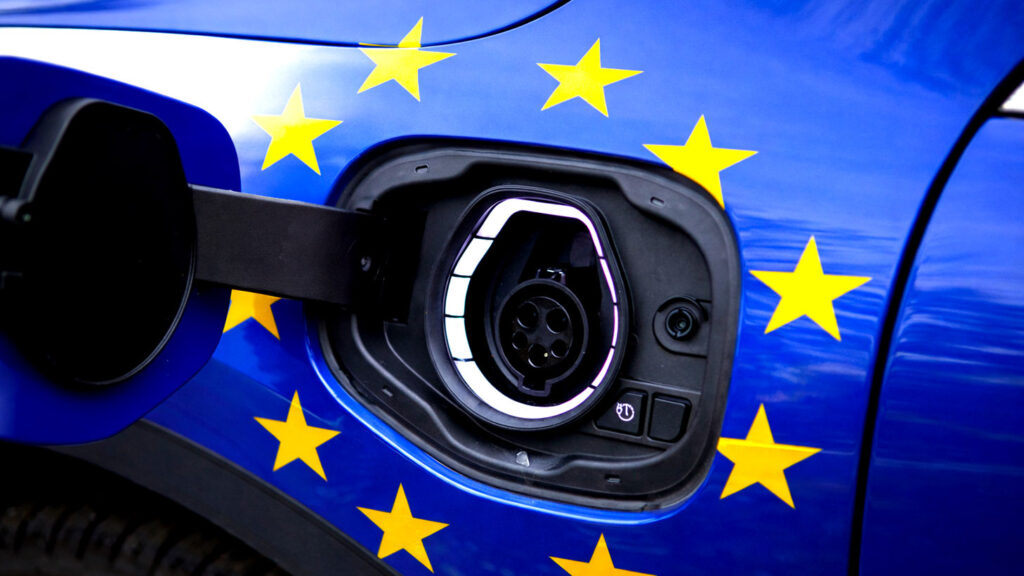Europe Just Replaced Tesla With A New EV Sales Champion

- Model Y and Model 3 sales dropped sharply across Europe.
- VW ID.3, ID.4, and ID.7 all saw major sales growth last year.
- Tesla’s decline highlights growing EV pressure from rivals.
It’s no secret that Tesla had a tough run in Europe last year. After several years of outpacing legacy automakers in EV sales, 2025 brought a sharp reversal that few would have seen coming just a couple of years ago. The brand that once led the electric car race is now falling behind a familiar rival with a very different backstory.
Read: BYD Sold Nearly Three Times As Many Cars As Tesla In Europe
Volkswagen sold more battery-electric vehicles in Europe than Tesla last year. Yes, VW, the same manufacturer that was mired in the diesel emissions scandal just as Tesla was gearing up for the Model 3, has now overtaken the American brand on its home turf.
Changing of the Guard
According to figures from Dataforce reported by Autonews, the VW brand moved 274,417 fully electric vehicles in Europe in 2025, a jump of 56 percent from its 2024 total of 175,654. Things weren’t so pretty for Tesla.
Its sales declined 27 percent last year, dropping from 326,714 units to 238,765. This came despite the fact that the Tesla Model Y remains Europe’s best-selling EV with 151,331 units sold last year, significantly more than the 94,106 Skoda Elroqs that were sold over the same period. However, Model Y sales were still down 28 percent from 2024, when 210,265 were sold.
Europe’s Best-Selling EVs
| Rank | Model | 2025 | 2024 |
| 1 | Tesla Model Y | 151,331 | 210,265 |
| 2 | Skoda Elroq | 94,106 | 46 |
| 3 | Tesla Model 3 | 86,261 | 112,967 |
| 4 | Renault 5 E-Tech | 81,517 | 13,097 |
| 5 | VW ID.4 | 80,123 | 64,729 |
| 6 | VW ID.3 | 78,667 | 54,467 |
| 7 | VW ID.7 | 76,368 | 32,192 |
| 8 | BMW iX1 | 69,816 | 53,272 |
| 9 | Kia EV3 | 66,802 | 4,960 |
| 10 | Skoda Enyaq | 65,787 | 67,331 |
| — | TOTAL | 2,582,595 | 1,990,956 |
Dataforce
Helping the VW brand take the top place from Tesla is the fact that it has a larger range of EVs. For example, the VW ID.4 sold 80,123 units last year, up 23.8 percent. A total of 78,667 VW ID.3s were sold, up 44.4 percent. The ID.7 also saw growth, with 76,368 units finding new homes, a 137.2 percent rise.
To put these figures into perspective, Tesla sold 86,261 Model 3s. And while that beat out any individual VW model, it was still down 23.6 percent from 2024.
VW Conquers All…Almost
VW’s strong year wasn’t limited to EVs. It also topped Europe’s plug-in hybrid (PHEV) segment, selling 159,173 units, a 205 percent jump from 2024. That was enough to comfortably beat BMW, with 142,285 sales, followed by Mercedes-Benz at 135,878 and Volvo at 104,270.
The VW brand also led in both gasoline and diesel vehicle sales. Its gas-powered lineup moved 737,821 units in 2025, staying well ahead of Peugeot’s 492,133, despite VW recording a 7.3 percent decline. Diesel sales reached 269,277 units, down 19.4 percent from the previous year, but still enough to edge out Mercedes, which sold 250,326.
Europe’s Top-Selling EV Brands
| Brand | Sales | Diff. vs 2024 | |
| 1 | VW | 274,417 | 56% |
| 2 | Tesla | 238,765 | −27% |
| 3 | BMW | 193,186 | 15% |
| 4 | Skoda | 172,100 | 117% |
| 5 | Audi | 153,848 | 51% |
Dataforce
Traditional hybrids were the only powertrain segment that VW didn’t take top honors in, as Toyota held the crown with 626,675 sales. Although VW didn’t rank in the top five, things could change this year as it plans to launch the new T-Roc, complete with a hybrid powertrain.
